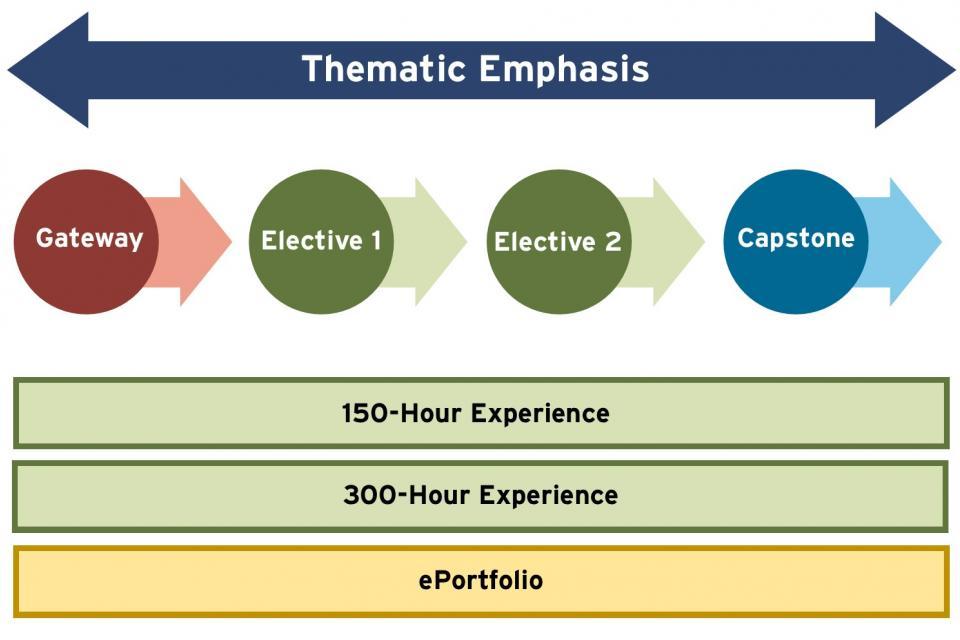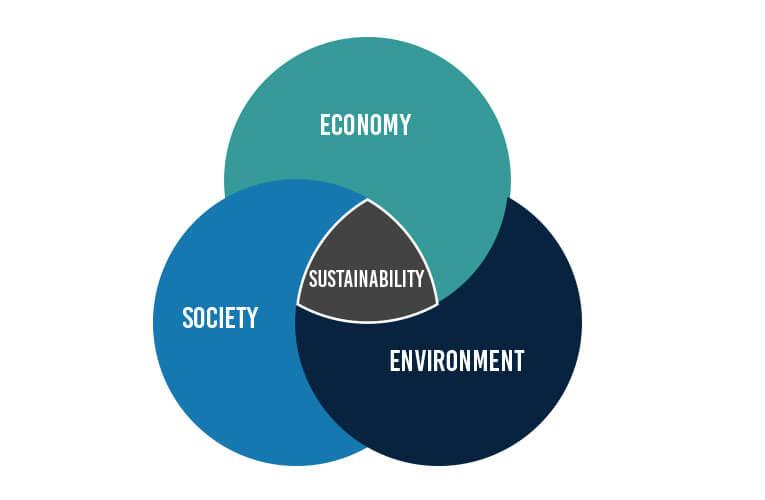Design Your Certificate Pathway
To earn the Sustainability Engagement Certificate, you must take four courses, complete two experiences, and create a public-facing ePortfolio. Your choices are guided by a thematic emphasis that weaves throughout your experiences and elective courses.
Below are some example pathways to help you think through your certificate design process.
- Environmental Justice
- Corporate Social Responsibility
- Food Systems and Security
- Sustainable Energy Systems
Certificate Requirements
Overview of Requirements
To earn the Sustainability Engagement Certificate, you must complete:
- A gateway course
- Elective 1
- Elective 2
- A capstone course
- A 150-hour experience
- A 300-hour experience
- A public-facing ePortfolio.
Your choices are guided by a thematic emphasis that weaves throughout your experiences and elective courses.
Courses (4)
To complete the certificate, you will need to complete four courses in the following sequence:
- Gateway
- Elective 1
- Elective 2
- Capstone
Gateway
The Gateway course, The Theory and Practice of Sustainability (ENVIRON 245), is typically offered during both the fall and spring semesters. You must take the Gateway course prior to both electives and the capstone.
Electives
Electives are an opportunity for you to further explore your interests and your chosen theme. Elective courses must engage with at least two of the three pillars of sustainability: Environment (E), Society (S), and Economics (Ec). Taken together, the electives must engage with all three pillars of sustainability. At least one elective must originate outside of the Nicholas School of the Environment.
You may choose from this electives list or petition your thematic advisor to include another course.
In place of an elective course, you may choose to participate in a Bass Connections project. Examples of past Bass Connection projects include:
- Animal Waste Management and Global Health (2016-17)
- Innovation & Technology Policy Lab (2015-16)
- Developing Departmental Energy Reports and a Carbon Pricing Program for Duke University (2016-17)
- The Effects of Unconventional Shale Gas Development on Rural Communities (2015-16)
- Energy and the Environment: Design and Innovation (2015-16)
Capstone
The Capstone (SUSTAIN) is a culminating seminar with a group project to integrate the academic and experiential components of the Certificate and is offered during the spring semester. The Capstone must be taken after all other courses are completed. However, you may complete one experience concurrently with the course.
Experiences (2)
You must also complete two immerive co-curricular experiences to earn the Sustainability Engagement Certificate. These experiences are an opportunity for you to gain hands-on experience related to the thematic emphasis you have chosen for your certificate.
- One experience must exceed 300 hours.
- The other experience must exceed 150 hours.
Experiences are completed at any time during the certificate (either during the academic year or summer) and one experience may be completed at the same time as the Capstone. You may also count one experience prior to taking the Gateway course.
Each experience must deeply engage with at least two of the three pillars of sustainability; combined, both experiences must engage with all three pillars of sustainability.
Some examples of experiences include the following:
- DukeEngage
- DukeImmerse
- Pre-Orientation
- Summer internships
- Long-term volunteer opportunities
ePortfolio (1)
The ePortfolio is a creative space to showcase what you've done througout your Sustainability Engagement Certificate experience. All components of the certificate will be represented in your ePortfolio, namely artifacts and reflections from your courses and experiences.
All ePortfolios must be created in PebblePad, Duke's ePortfolio tool, and students will receive training and support in how to use PebblePad. Your personal ePortfolio will be periodically assessed and must meet expectations in order to receive the certificate. Your ePortfolio will also be public-facing and accessible to prospective employers.
Past students
Brandon Dawson T'20, Public Policy Studies
Certificate Theme: Environmental Justice
Check out Brandon's ePortfolio
Margaret Overton T'20, Environmental Sciences & Policy
Certificate Theme: Corporate Social Responsibility.
Check out Margaret's ePortfolio
Andrea Kolarova T'20, Environmental Sciences
Certificate Theme: Community-Based Environmental Management
Check out Andrea's ePortfolio
Student Feature
Q+A with Sam Schulteis
Sam Schulteis, an Environmental Sciences & Policy major also pursuing a Certificate in Sustainability Engagement, recently shared insights into why she chose to major in ENV, why she added the certificate, what she has learned, her favorite experience and advice for students considering the major or certificate.
Focus of Study
The Certificate is designed to facilitate learning and research that confronts the interconnections between environmental, economic, and social aspects of sustainability. Although conceptions of the word “sustainability” often privilege the environmental component of the word, the Certificate is designed to facilitate understanding the importance of all three aspects.
Eligibility
The Sustainability Engagement Certificate is open to undergraduate students – from all majors – currently enrolled at Duke University. The certificate is earned upon graduation in conjunction with your major degree. Second-semester first-years, sophomores, and first-semester juniors are eligible to apply. Students may apply as early as the spring semester of their first year.
How to Apply
- Your application is your opportunity to demonstrate a good fit with the program and put together a cohesive and thoughtful pathway through the requirements. If you are starting your process and would like to talk to a Certificate Advisor about your ideas, please submit the general interest form.
- If you are ready to apply to the certificate, please submit the certificate application.
Deadline
In order to ensure you have enough time to complete requirements, you must apply to complete the certificate by the beginning of your junior year. Applications for juniors are due no later than the date designated for reporting mid-term grades in the fall of your junior year; applications are accepted on a rolling basis for first-years and sophomores.
Frequently Asked Questions
If your question is not addressed below, please email us at sustain_cert@duke.edu
Browse Frequently Asked Questions (FAQs)
Applying
When should I apply?
You are encouraged to apply as soon as you are eligible and feel ready to complete the application. The benefits of applying earlier are that you will have a longer period of time over which to complete the requirements and you will have earlier access to the advising and enrichment opportunities that accompany the program.
What if I don’t know what I want my area of focus to be?
You should apply to the certificate with a clear set of your goals for the program as well as a general interest area that you want to focus on through your courses and experiences. However, we understand that your plan may evolve as you progress through your undergraduate career and accumulate more experience. Feel free to contact Sustainability Certificate representatives if you want to discuss your particular path and components.
Do I need to know what my specific experiences will be when I apply?
You do not need to know what your specific experiences will be at the time you apply to the Sustainability Engagement Certificate. However, you should be able to broadly identify the type of experiences you want to undertake as part of the certificate, and justify why they are a good fit for your overall pathway through the program.
May I change my plan for my courses and experiences after I am accepted into the program?
You may change the selection and timing of your courses and experiences after you are accepted into the program. We understand that your plan may evolve as you progress through your undergraduate career and accumulate more experience. Regardless, the courses and experiences you end up completing must together form a cohesive pathway and coherent story.
fulfilling Requirements
How long does it take to complete the certificate?
This varies, depending on when you start the program. You have until the time you graduate from Duke to complete the certificate requirements.
Does my Gateway count if I took it prior to applying?
Yes. If you complete the approved Gateway course, it will count towards your certificate requirements, regardless of when it was taken or when you apply.
I have already completed a relevant experience prior to applying. Will it count towards my certificate requirements?
Yes, it can. One experience may predate your application and completion of the Gateway course. However, both experiences must be aligned with your area of focus.
How do I know if an experience I identify will count towards the certificate?
After you are admitted into the program, you will fill out a series of forms that will be used to determine if an experience meets the criteria for the certificate. The general criteria for an experience are that it is hands-on and practical, is innovative and entrepreneurial in some way, and helps further your individual objective(s) for completing the certificate.
Do the experiences have to be completed over the summer?
The experiences are not time-bound. You may choose to do them at any time and over any period of time, as long as they meet the minimum hour requirements and are both completed prior to taking the Capstone
I have already taken one of the electives prior to applying. Will it count towards my certificate requirements?
The recommended sequence of courses is:
- Gateway
- Elective
- Elective
- Capstone
One experience may occur prior to the Gateway, but no electives will count that precede the Gateway. That said, electives may be taken concurrent with the Gateway.
I have found an elective I want to take for the certificate that is not on the approved list. Will it count towards the certificate?
If you have already been accepted into the Certificate, contact your thematic advisor and provide the elective course title, description, syllabus (if available), and rationale for why you believe this course fits your pathway and should count for the certificate. If you are applying for the program, feel free to suggest any elective that you believe meets your chosen theme.
Will courses, internships, or independent studies I have taken that count towards the requirements of my major / minor / certificate also count towards the Sustainability certificate?
No more than one course taken for the Certificate may be used to satisfy the requirements of a major, minor, or other certificate program. An experience may also double count towards the Public Policy Studies internship program, the Global Health experience, or other such non-credit bearing experiences. Experiences may not be credit-bearing, with one exception. If hours spent on service-learning activities in a for-credit course bearing a Service Learning label at Duke, and if those hours clearly match the thematic of a students Certificate focus, those hours may count towards the 150-hour experience.
Do I have to take the Capstone during the spring semester of my senior year?
You are not required to take the Capstone course during the second semester of your senior year, although this is likely when most people will take it. You may take the Capstone any semester after you have completed the Gateway, two Electives, and one of the 150- and 300-hour experiences. You may be completing one of your experiences concurrently with the Capstone course.
What are the requirements of the ePortfolio?
After you are admitted into the program, you will be provided a comprehensive set of guidelines for completing the ePortfolio, which will be in PebblePad. These guidelines will provide clear instructions for everything from how to set up your ePortfolio to the specific content that it should contain and how it is assessed.
Other Topics
May I take courses for the Sustainability Engagement Certificate is I am not a part of the program?
The Gateway and Electives are open to all Duke undergraduates (and in some cases, graduate students as well), but make sure to check the individual course listings to determine if any of them have specific restrictions or prerequisites. The Capstone course is restricted to students in the Sustainability Engagement Certificate program only.
What are further resources or opportunities available to me if I join the program?
As a member of the Sustainability Engagement Certificate program, you will become part of a community of Duke students dedicated to sustainable practices. Certificate students will also have individual advising as well as special access to workshops, speakers, mentorship, and networking opportunities.







